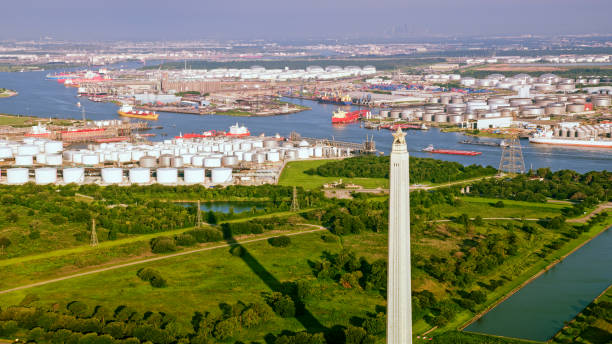The Birth of the Oil Boom
In 1901, the Spindletop gusher near Beaumont, Texas, erupted, marking a transformative moment in the state’s economic history. While the gusher itself was miles away from Houston, the effects rippled directly into the city’s economy. Oil refineries and energy companies began to migrate to Houston, drawn by the city’s proximity to ports, railroads, and infrastructure. This discovery redefined Houston’s future, shifting it from a regional trading hub into an economic powerhouse with a global presence.
Infrastructure and Industry: The Boom Takes Hold
As oil companies set up operations in Houston, the need for infrastructure skyrocketed. Railroads, pipelines, and shipping facilities expanded rapidly to accommodate the growing energy industry. The creation of the Houston Ship Channel played a pivotal role, providing companies with efficient access to the Gulf of Mexico and beyond. This period also saw the founding of many major oil companies that are still headquartered in Houston today, establishing the city’s reputation as the energy capital of the world.

The Social Impact of Oil Wealth
The oil boom did more than boost the economy—it reshaped Houston’s social structure. With oil magnates settling in the city, neighborhoods flourished, and cultural institutions like museums and theaters emerged. Philanthropy from oil wealth funded universities and hospitals, further cementing Houston’s place as a center for education and healthcare. However, the rapid industrial growth also brought challenges such as labor disputes and environmental issues that would shape the city’s policies in the years to come.
Houston’s Economy in the 20th Century: Oil Drives Diversification
By the mid-20th century, Houston had evolved into a bustling metropolis, its economy deeply rooted in the energy sector. Yet, as oil became a global commodity, the need for economic diversification arose. The city began investing in other industries, including aerospace, healthcare, and technology, ensuring it wouldn’t solely rely on oil revenues. Despite these shifts, oil remains a critical part of Houston’s identity, with many of the largest oil and gas companies headquartered in the city.
Key Challenges: Boom and Bust Cycles
Houston’s economy thrived during periods of high oil prices but struggled during downturns. The city’s ability to weather economic storms and adapt to changing market conditions became crucial. Initiatives to modernize energy production, including investments in renewable energy, demonstrate how Houston aims to remain relevant in a rapidly changing world. Today, Houston balances its legacy as an oil hub with efforts to lead in sustainable energy practices.